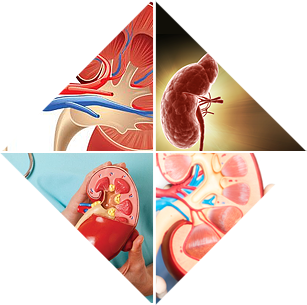
Kidney Transplant
A kidney transplant is a surgical procedure to place a functioning kidney from a donor into a person whose kidneys no longer function properly. When a person’s kidneys fail, three treatment options are available: hemodialysis, peritoneal dialysis and kidney transplantation. Many patients feel that a successful kidney transplant provides a better quality of life because it allows greater freedom and often is associated with increased energy levels and a less restricted diet. In making a decision about whether this is the best treatment for you, you may find it helpful to talk to people who already have had a kidney transplant. You also need to speak to your doctor, nurse and family members.
The Surgery
Kidney transplants are performed with general anesthesia, so
you're not aware during the procedure. The surgical team
monitors your heart rate, blood pressure and blood oxygen
level throughout the procedure.
During the surgery:
- The surgeon makes an incision and places the new kidney in your lower abdomen. Unless your own kidneys are causing complications such as high blood pressure or infection, they are left in place.
- The blood vessels of the new kidney are attached to blood vessels in the lower part of your abdomen, just above one of your legs.
- The new kidney's ureter — the tube that links the kidney to the bladder — is connected to your bladder.
Kidney transplant surgery usually lasts about three to four hours.
After the Surgery
After your kidney transplant, you can expect to:
- Spend several days to a week in the hospital. Doctors and nurses monitor your condition in the hospital's transplant recovery area to watch for signs of complications. Your new kidney will make urine like your own kidneys did when they were healthy. Often this starts immediately. In other cases it takes several days. Expect soreness or pain around the incision site while you're healing.
- Have frequent checkups as you continue recovering. After you leave the hospital, close monitoring is necessary for a few weeks. Your transplant team will develop a checkup schedule for you. During this time, if you live in another town, you may need to make arrangements to stay close to the transplant center.
- Take medications the rest of your life. You'll take a number of medications after your kidney transplant. Drugs called immunosuppressant help keep your immune system from attacking your new kidney. Additional drugs help reduce the risk of other complications, such as infection, after your transplant.

